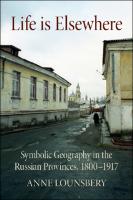Life Is Elsewhere
Symbolic Geography in the Russian Provinces, 1800–1917
Abstract
In Life Is Elsewhere, Anne Lounsbery shows how nineteenth-century Russian literature created an imaginary place called "the provinces"—a place at once homogeneous, static, anonymous, and symbolically opposed to Petersburg and Moscow. Lounsbery looks at a wide range of texts, both canonical and lesser-known, in order to explain why the trope has exercised such enduring power, and what role it plays in the larger symbolic geography that structures Russian literature's representation of the nation's space. Using a comparative approach, she brings to light fundamental questions that have long gone unasked: how to understand, for instance, the weakness of literary regionalism in a country as large as Russia? Why the insistence, from Herzen through Chekhov and beyond, that all Russian towns look the same? In a literary tradition that constantly compared itself to a western European standard, Lounsbery argues, the problem of provinciality always implied difficult questions about the symbolic geography of the nation as a whole. This constant awareness of a far-off European model helps explain why the provinces, in all their supposed drabness and predictability, are a topic of such fascination for Russian writers—why these anonymous places are in effect so important and meaningful, notwithstanding the culture's nearly unremitting emphasis on their nullity and meaninglessness.
Keywords
comparative literature, symbolic geography, empire in literature, genre studies, regionalismDOI
10.7298/pgj7-gx97ISBN
9781501747946, 9781501747922, 9781501747939, 9781501747915, 9781501747946Publisher
Cornell University PressPublisher website
https://www.cornellpress.cornell.edu/Publication date and place
Ithaca, 2019Imprint
Northern Illinois University PressSeries
NIU Series in Slavic, East European, and Eurasian Studies,Classification
History of other geographical groupings and regions
Literature: history and criticism


 Download
Download Web Shop
Web Shop